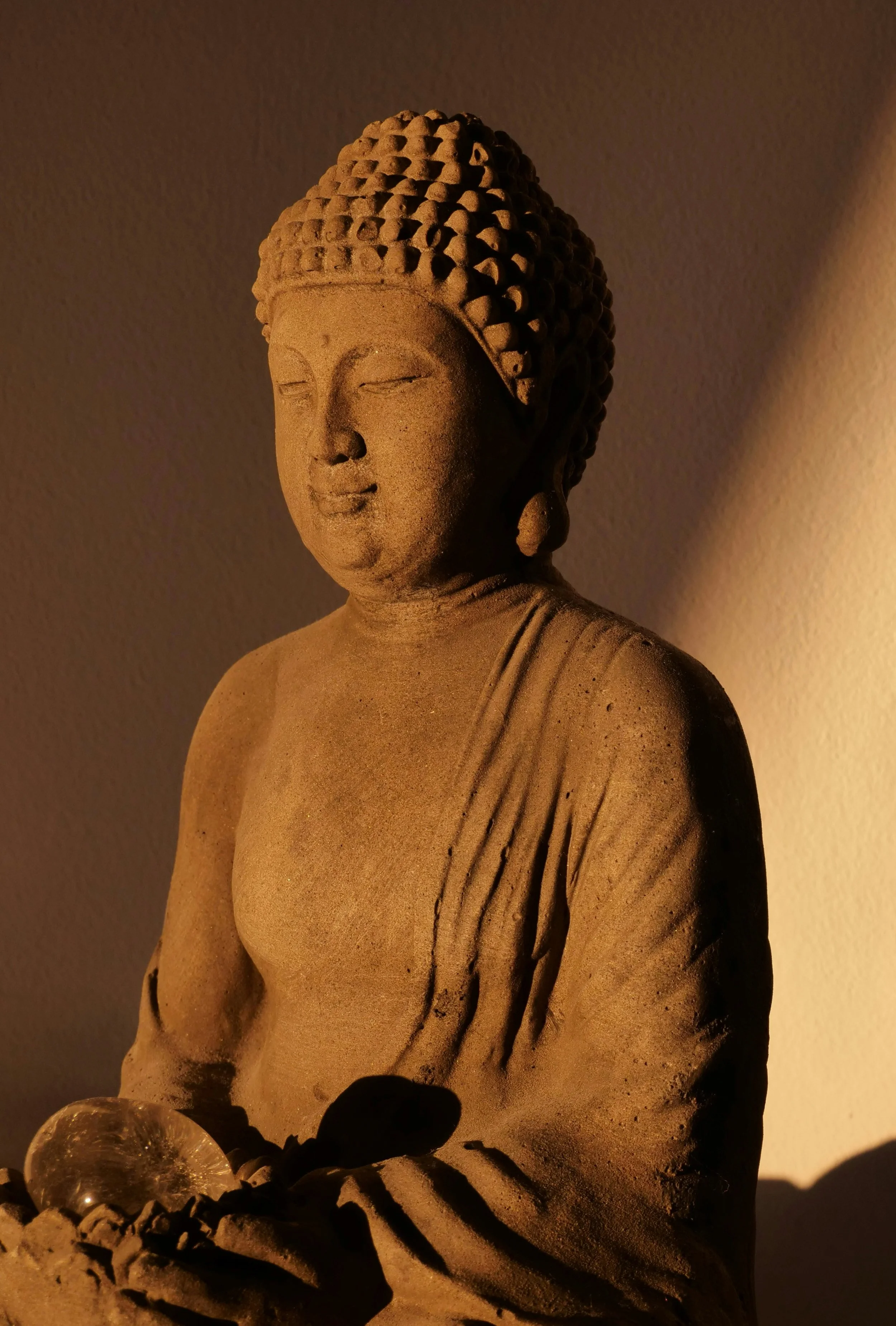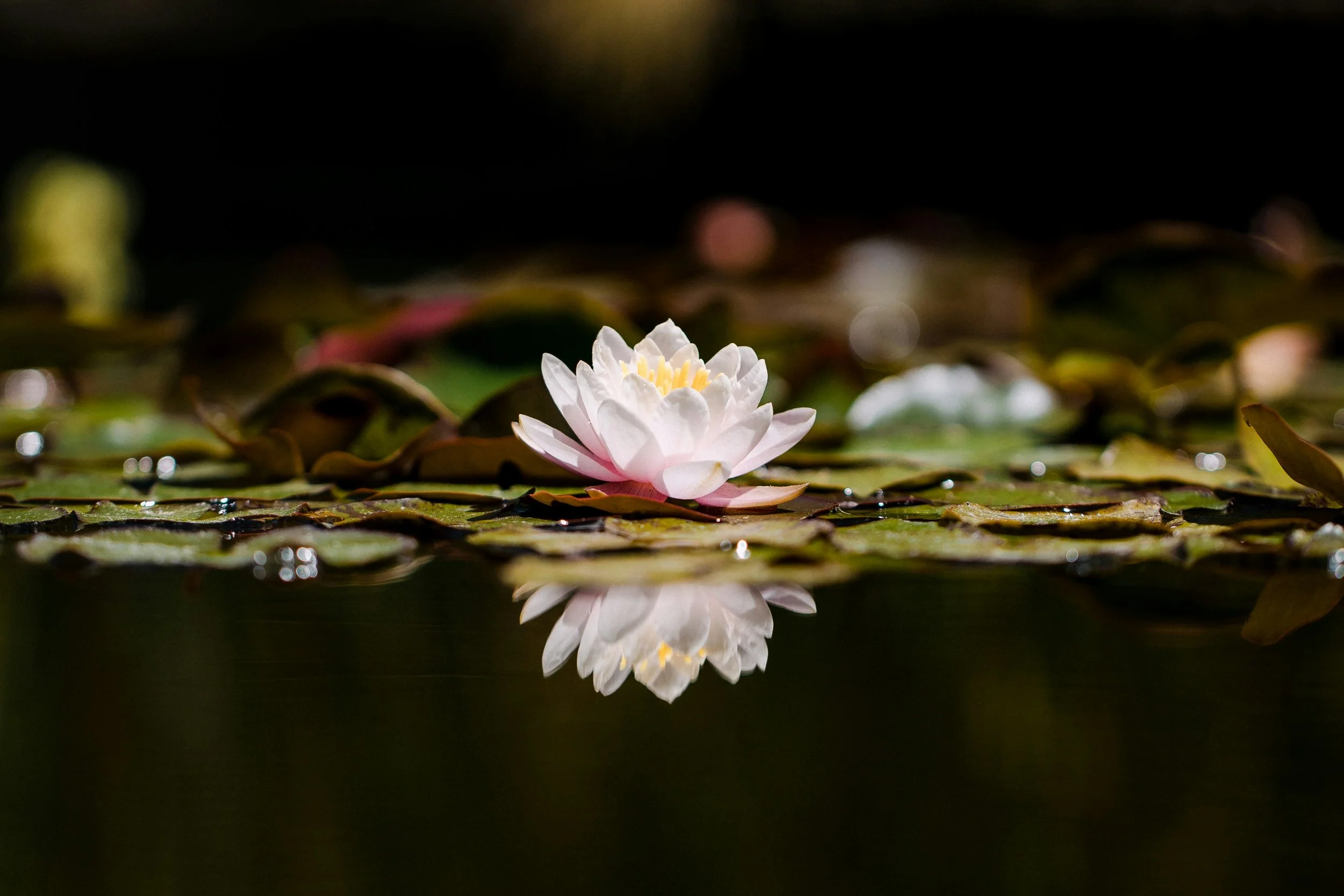What is recovery dharma?
Recovery Dharma applies Buddhist principles directly to addiction recovery.
Written by Emma Nagle, LCSW | September, 29, 2025
For nearly a century, Alcoholics Anonymous and its 12-step philosophy have dominated the landscape of addiction recovery. Its influence is so widespread that for many, it’s the only social support model they’ve ever been offered. But as conversations around mental health, trauma, spirituality and neurodiversity deepen, so too does a growing recognition that recovery isn’t one-size-fits-all. Out of disillusionment and growing awareness of just how diverse the population affected by addiction truly is, alternative secular mutual support organizations like SMART Recovery, which focuses on Cognitive-Behavioral Therapy based skills and in the 2010’s, Refuge Recovery, a Buddhist-based community, began to develop. What follows is an exploration of Recovery Dharma — how Buddhist teachings on suffering, impermanence, and compassion can offer a radically different approach to healing. We’ll consider how it stands alongside traditions like AA, while carving out its own space for those seeking a path less tethered to faith. Along the way, you’ll find glimpses of what meetings feel like and where to turn if you sense this might be a community for you.
Buddhism offers a more flexible pathway to spiritual healing that does not involve “defects of character,” and instead proposes that: Suffering is part of life, but through awareness, ethical living, and mindful presence, we can reduce suffering and cultivate freedom. At its core, Buddhism teaches that craving, attachment, and aversion are the roots of suffering and that liberation comes from seeing these clearly, responding with compassion, and living with intention. This concept of suffering resonates for many stuck in the cycle of addiction and has since become a fully-formed addiction recovery program with a growing community.
Before discussing the Buddhist-based approach to recovery in detail, it is important to note the rupture that occurred within Refuge Recovery in 2018 following allegations made against the founder of the program Noah Levine, that led to a significant portion of the community breaking away and intentionally forming a separate leaderless, peer-governed organization. This new non-hierarchical organization was designed to be non-charismatic and rooted in shared wisdom rather than individual authority and became known as Recovery Dharma.
So, What is Recovery Dharma?
Recovery Dharma is a peer-led movement and community that is founded on the trust in the potential for all to recover and find freedom from the suffering of addiction. Recovery Dharma offers a path to healing that blends ancient Buddhist principles with the lived experience of addiction recovery.
In this community, Buddhist teachings, known as the Dharma, are applied to addiction recovery in an effort to live a life of true freedom and emphasizes personal agency and empowerment over powerlessness seen in the 12-step approach. Recovery Dharma sees addiction as a form of suffering rooted in craving and disconnection. The practices and principles used are applicable for all types of addictions (alcohol, drugs, process addictions) and really any repetitive or habitual behavior that is causing suffering.
The path to healing involves mindfulness, self-inquiry, and community support, not shame, willpower or moral judgment. A commitment to abstinence or thoughtful boundaries* with the behavior are asked for to allow for awareness of the relationship to the behavior and any other harmful behaviors to become apparent. The Recovery Dharma (2023) book states, “Recovery is a lifelong, holistic process of peeling back layers of habits and conditioned behaviors to find our own potential for awakening.” While on the path to healing expect to commit to deepening your understanding of the Four Noble Truths and to practicing the Eightfold Path (the core texts that guide the community in RD) in daily life.
*Thoughtful boundaries may be required when abstinence is not possible or probable such as in the case with food and sex addiction.
The belief is that through practices like meditation, honest reflection, and ethical living, people can learn to face discomfort rather than escape it. Recovery Dharma describes this as a philosophy and a plan of action - all found in the Eightfold Path. The investigation of one’s mind through a meditation practice is a major component of the work and encouraged to be practice in and outside of meetings. Below you’ll find an introduction to the teachings that are the foundation of the program.
“Recovery is rooted in finding our own
inner wisdom & individual journeys.”
The Four noble truths
The Four Noble Truths, lessons from the Buddha about the cycle of existence, are at the heart of the Dharma.
These four truths below, and the corresponding commitments, are the foundation of the Recovery Dharma program:
There is suffering.
We commit to understanding the truth of suffering.
There is a cause of suffering.
We commit to understanding that craving leads to suffering.
There is a way of ending suffering.
We commit to understanding and experiencing that less craving leads to less suffering.
There is a path that leads to ending suffering.
We commit to cultivating the path.
Similar to “working the steps” in Alcoholics Anonymous, The Four Noble Truths in Recovery Dharma are explored through writing and sharing in-depth, detailed inquiries found in the book. These can be worked on with the guidance of a mentor or therapist, in partnership with a trusted friend, or with a peer group. An Inquiry Circle are small closed groups who meet weekly with the goal of completing their inventories. The fourth noble truth tells us that there is a way to end suffering by following the Eightfold Path, listed below:
THE Eightfold path
Wise Understanding
Wise Intention
Wise Speech
Wise Action
Wise Livelihood
Wise Effort
Wise Mindfulness
Wise Concentration
The Eightfold Path is a way of life that is followed and practiced to the best of one’s understanding and capacity. In other words, how this practice will be interpreted is up to you. The Path can serve as both a religious and non-religious journey.
Rather than labeling people as “addicts,” and contrary to most well-known mutual support organizations available, Recovery Dharma emphasizes impermanence, non-identification, and the belief that everyone has the capacity to wake up and change. The Recovery Dharma text encourages the customization of one’s recovery course - a refreshing take on healing for many who have felt out of place in the framework of stricter programs.
Powerlessness is a key component of common recovery work, where personal weakness is highlighted, and reliance on external willpower and higher powers is valued. Recovery Dharma's view on powerlessness is nuanced: it's not about personal weakness, but about a profound understanding of craving and attachment as the root of suffering, as taught in Buddhist principles. By acknowledging this powerlessness over addiction's grip, individuals are encouraged to engage in the process of letting go of attachments, using mindfulness and meditation to develop inner strength and find freedom, rather than relying on external willpower or higher powers.
One of the aspects that makes Recovery Dharma distinct is that it does not require members to adopt Buddhist beliefs or any religious framework. While the program draws inspiration from Buddhist principles like mindfulness and compassion, participation is not tied to faith or doctrine. This stands in contrast to 12-step programs such as AA, where the language of “God” and prayer are woven into the structure of meetings. Even with the flexibility to interpret “God” more loosely like “Good Orderly Direction,” for example, many people find the faith-based tone and higher power concept to be alienating. Recovery Dharma offers a different path: one grounded in meditation, self-inquiry, and community support, without the need for prayer or spiritual hierarchy.
What to Expect at a Recovery Dharma Meeting
A typical Recovery Dharma meeting begins with a guided meditation (15-20 minutes), followed by a reading from the Recovery Dharma text, and then group discussion or sharing. Participants reflect on how the reading or meditation connects to their own recovery, though speaking is always optional. Listening is equally valued. Meetings are peer-led, welcoming, and emphasize confidentiality. Like most mutual support meetings, formats vary (book study, open sharing, or meditation-focused), but all offer a supportive space to practice mindfulness, explore cravings and emotions, and connect with others on a similar path. The meeting ends with a closing reading or ritual, often a “Dedication of Merit.” This is a way to conclude together, expressing goodwill or positive intention. RD offers meetings (sangha groups) online and in-person, however the abundance of meetings in your area may be limited due to the fact that the community is still growing in popularity.
“Recovery means empowerment and we support
each other as partners walking the path together.”
Expanding the Path
Recovery Dharma has grown because so many people struggled to feel at home in traditional mutual support groups. For those who did not connect with prayer, faith-based language, or the idea of surrendering to a higher power, the path forward often felt limited. Out of this need came a community that centers mindfulness, compassion, and personal responsibility. The rise of Recovery Dharma is a reminder that there is no single blueprint for recovery. People need different kinds of spaces to heal, and for many, meditation and Buddhist-inspired practices offer a grounding, non-dogmatic alternative. At its best, Recovery Dharma is not just a program, but a movement. One that expands the landscape of recovery so more people can find a place where they truly belong.
Recovery Dharma reminds us that healing can be both personal and communal. That recovery is not about adhering to a rigid framework, but about finding practices that allow for curiosity, connection, and self-compassion. Whether through meditation, shared wisdom, or the supportive presence of others on the same path, this approach provides space for those who seek recovery without the overlay of religious language or belief systems. At its heart, Recovery Dharma offers not just freedom from addiction, but the possibility of living with greater clarity, balance, and meaning.
NO MUD,
no lotus.
Want to Learn More?
Read the Recovery Dharma book here.
Find a meeting here.
Listen to meditation audio recordings or read meditation scripts here.
Need a different kind of addiction support? Call 1-877-8-HOPENY (467369)
Have a loved one struggling with substance use? Check out this article: How To Support a Loved One With Addiction.

